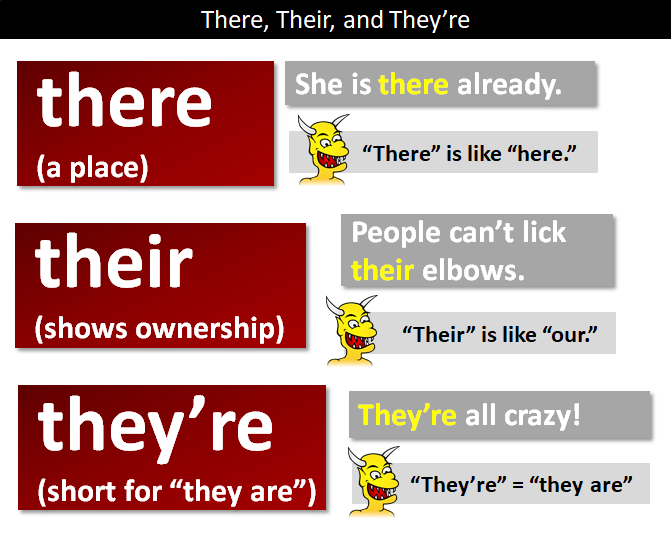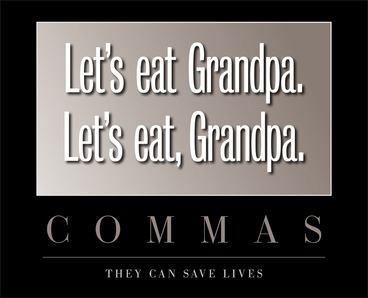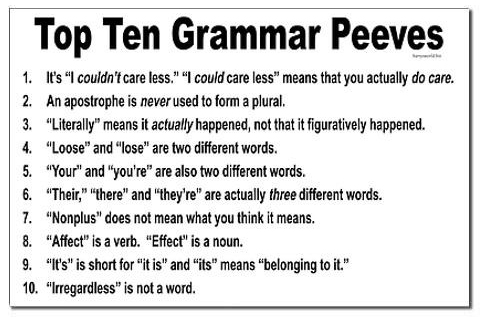Current Events
Maybe it’s the age of texting we live in. Maybe it’s the demise of actual handwriting. I don’t know and I am baffled. However, what I do know is that just because a word SOUNDS right doesn’t mean it IS right.
For example, you can’t use the word “YOUR” however you want. The word is possessive, meaning something belongs to you:
“This is YOUR pen.” “Is that YOUR car?”
The word is NOT interchangeable just because it sounds similar to another word. So, it is wrong to say:
“I think YOUR great.” “YOUR one of the smartest people I know.”
WRONG, WRONG WRONG!!!
The correct word to use in the above example would be the contraction “YOU’RE,” which is short for “YOU ARE.” Or in other words, just because “YOUR” and “YOU’RE” seem to sound the same, they are NOT the same. “YOUR” rhymes with “door” and “YOU’RE” rhymes with “sewer.” See the difference?
So, fellow pet-peevers unite! It’s time to right this wrong! Here is an everyday guide to the most commonly misused words in the English language, along with correct and incorrect examples of use. Please share this with all those friends you know and love who butcher the English language daily — and if you can think of any other examples not listed, feel free to list them in the comments section below.
YOU’RE: is a contraction, used in place of saying “You are.”
Correct Example: “YOU’RE very clumsy.”
.
YOUR: is a possessive adjective, used to denote belonging to.
Correct Example: “You dropped YOUR keys.”
.
.
• Wrong Usage:“YOUR very clumsy, because you dropped YOU’RE keys.”
✓ Right Usage: “YOU’RE (You are) very clumsy, because you dropped YOUR keys.”
.

THEY’RE: is a contraction, used in place of saying “They are.”
Correct Example: “I think THEY’RE going.”
.
THERE: is an adverb, used to describe a place.
Correct Example: “Go over THERE.”
.
THEIR: is a possessive adjective, used to denote belonging to.
Correct Example: “This is THEIR camper.”
.
• Wrong Usage:“I think THEIR going over THEY’RE to THERE camper.”
✓ Right Usage:“I think THEY’RE (They are) going over THERE to THEIR camper.”
.
.
TWO: is a number.
Correct Example: “I have TWO children.”
.
TOO: is an adverb, used to describe something in abundance.
Correct Example: “The temperature is TOO hot outside.”
.
TO: is traditionally used to describe direction.
Correct Example: “Let’s go TO the beach.”
.
• Wrong Usage:“My TOO children think it’s TO hot TWO go swimming.”
✓ Right Usage:“My TWO children think it’s TOO hot TO go swimming.”
 |
| Ignorance is NOT sexy! |
IT’S: is a contraction, used in place of “It is.”
Correct Example: “Look at my dog. IT’S playing a game.”
.
ITS: is a possessive adverb, used to denote ownership.
Correct Example: “Look at my dog and ITS chew toy.”
.
.
• Wrong Usage:“Look at my dog. ITS playing a game with IT’S chew toy.”
✓ Right Usage:“Look at my dog. IT’S (It is) playing a game with ITS chew toy.”

HEAR: is relative to sound.
Correct Example: “I HEAR the car alarm.”
.
HERE: is an adverb, used to denote a place.
Correct Example: “Honey, come HERE.”
.
• Wrong Usage:“Honey, come HEAR. I think I HERE the car alarm.”
✓ Right Usage:“Honey, come HERE. I think I HEAR the car alarm.”
.
LOOSE: is an adjective, meaning not properly fitted.
Correct Example: “My class ring is LOOSE.”
.
LOSE: is a verb, meaning to miss from one’s possession.
Correct Example: “I don’t want to LOSE my ring.”
.
.
• Wrong Usage: “My class ring is so LOSE, I’m afraid I might LOOSE it.”
✓ Right Usage:“My class ring is so LOOSE, I’m afraid I might LOSE it.”

OK, so what did I miss? Can you think of any other examples of misuse of correct grammar and the English language? Feel free to share them in the comments section below.






Paraphrasing and also outlining are both indispensable writing instruments. There're both techniques of adding additional writers' functions as well as concepts into your current writing in your unique terms.
My recent post A Guide for Doing Proper Grammar Sentence Correction
nice tops
This is a pet peeve of mine. Thanks for posting this.